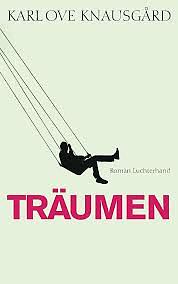Take a photo of a barcode or cover
Hij heeft het weer te pakken. Kan er nog steeds niet bij hoeveel zelfdestructie er in één man past
challenging
dark
emotional
reflective
relaxing
slow-paced
Plot or Character Driven:
A mix
Strong character development:
Complicated
Loveable characters:
Yes
Diverse cast of characters:
No
Flaws of characters a main focus:
Yes
I sobbed aloud with sorrow and joy, sorrow and joy, sorrow and joy
This one left me feeling empty yet so full of life at the same time. Can't wait to finish the series
This one left me feeling empty yet so full of life at the same time. Can't wait to finish the series
dark
emotional
reflective
sad
medium-paced
"What were thoughts worth? What was consciousness other than the surface of the soul’s ocean, other than small brightly colored boats, floating plastic bottles and driftwood, waves and currents, whatever the day might bring over a depth of several thousand meters? No, depth was the wrong word. What was consciousness other than a cone of light from a torch in the middle of a dark forest?" A brilliant return to form after the somewhat unengaging struggles of Knausgaard's adolescent years in volumes 3 and 4.
57th book of 2024.
4.5. After studying writing for six years, it was only natural that I was most excited for Vol. 5, the volume where Knuasgaard attends the Writing Academy and has Jon Fosse, no less, as one of his teachers. I'm a fan of Fosse's work so I found all the descriptions and dialogue with him fascinating, and it's aged so well as he's now a Nobel winner. Knausgaard's dreams are dashed though, and he struggles to comprehend that he may not be up to being a writer (though, what dramatic irony it is to read); he, at one point, in his frustration, after his poetry is slashed in a workshop, writes a two page spread like this: 'CUNT. CUNT. CUNT. CUNT' etc., for two pages of the book. He even considers reading it out to the class as his piece the following day, but is dissuaded. The structure of the series as a whole becomes fairly turbulent here as we meeting Tonje, his first wife, and even running to the point where his father dies and the funeral, which loops us right back into the timeframe of Vol. 1.
I wasn't going to talk about Knausgaard and the series as a whole until I'd finished, but I do want to say how generally 'unlikeable' he is in this one, and yet we both still respect him and would want a drink with him. We discussed it briefly and decided on the fact that, most of the time, Knausgaard is a victim. It's his own doing, but he is a victim of alcohol, just like his father was. In that respect despite the awful things he does (there are several in this, one far more shocking than the others), I couldn't help but also pity him, deserving or not. Does his honesty, also, make his unlikeable traits more likeable, simply because he's owning up to them? Once I get to the end, perhaps I'll be able to explore that, him, and the whole purpose behind these thousands and thousands of pages.
4.5. After studying writing for six years, it was only natural that I was most excited for Vol. 5, the volume where Knuasgaard attends the Writing Academy and has Jon Fosse, no less, as one of his teachers. I'm a fan of Fosse's work so I found all the descriptions and dialogue with him fascinating, and it's aged so well as he's now a Nobel winner. Knausgaard's dreams are dashed though, and he struggles to comprehend that he may not be up to being a writer (though, what dramatic irony it is to read); he, at one point, in his frustration, after his poetry is slashed in a workshop, writes a two page spread like this: 'CUNT. CUNT. CUNT. CUNT' etc., for two pages of the book. He even considers reading it out to the class as his piece the following day, but is dissuaded. The structure of the series as a whole becomes fairly turbulent here as we meeting Tonje, his first wife, and even running to the point where his father dies and the funeral, which loops us right back into the timeframe of Vol. 1.
I wasn't going to talk about Knausgaard and the series as a whole until I'd finished, but I do want to say how generally 'unlikeable' he is in this one, and yet we both still respect him and would want a drink with him. We discussed it briefly and decided on the fact that, most of the time, Knausgaard is a victim. It's his own doing, but he is a victim of alcohol, just like his father was. In that respect despite the awful things he does (there are several in this, one far more shocking than the others), I couldn't help but also pity him, deserving or not. Does his honesty, also, make his unlikeable traits more likeable, simply because he's owning up to them? Once I get to the end, perhaps I'll be able to explore that, him, and the whole purpose behind these thousands and thousands of pages.
emotional
sad
slow-paced
Plot or Character Driven:
Character
Strong character development:
Yes
Loveable characters:
Complicated
Diverse cast of characters:
No
Weer een prachtige Knausgard. Dit keer de levensfase waarin hij zijn ultieme drang om schrijver te worden probeert te verwezenlijken. Dit lukt niet als aanstormend talent op de schrijverscursus en een aantal jaren later is hij de oudere literatuurstudent die het niet heeft weten te maken.
De immer aanwezige gedachte dat hij niets voorstelt, de faalangst en zijn onvermogen op sociaal vlak maken deze jaren niet makkelijker. Wel weet hij een paar relaties aan te gaan, maar kenmerkend is zijn vermogen om afscheid te nemen van alles en iedereen. Hij ziet zichzelf daarom als gevoelloos en koud, alleen gericht op het pleasen van anderen, maar is dat niet ook het pleasen van zichzelf ?
Compromisloos beschrijft hij zijn innerlijke strijd en komen de vriendschappen en relaties voorbij die hij in die jaren heeft.
Bijna onmogelijk maar toch hoop ik op een ultiem laatste deel dat deze boekenserie op een gepaste manier zal afsluiten.
De immer aanwezige gedachte dat hij niets voorstelt, de faalangst en zijn onvermogen op sociaal vlak maken deze jaren niet makkelijker. Wel weet hij een paar relaties aan te gaan, maar kenmerkend is zijn vermogen om afscheid te nemen van alles en iedereen. Hij ziet zichzelf daarom als gevoelloos en koud, alleen gericht op het pleasen van anderen, maar is dat niet ook het pleasen van zichzelf ?
Compromisloos beschrijft hij zijn innerlijke strijd en komen de vriendschappen en relaties voorbij die hij in die jaren heeft.
Bijna onmogelijk maar toch hoop ik op een ultiem laatste deel dat deze boekenserie op een gepaste manier zal afsluiten.


